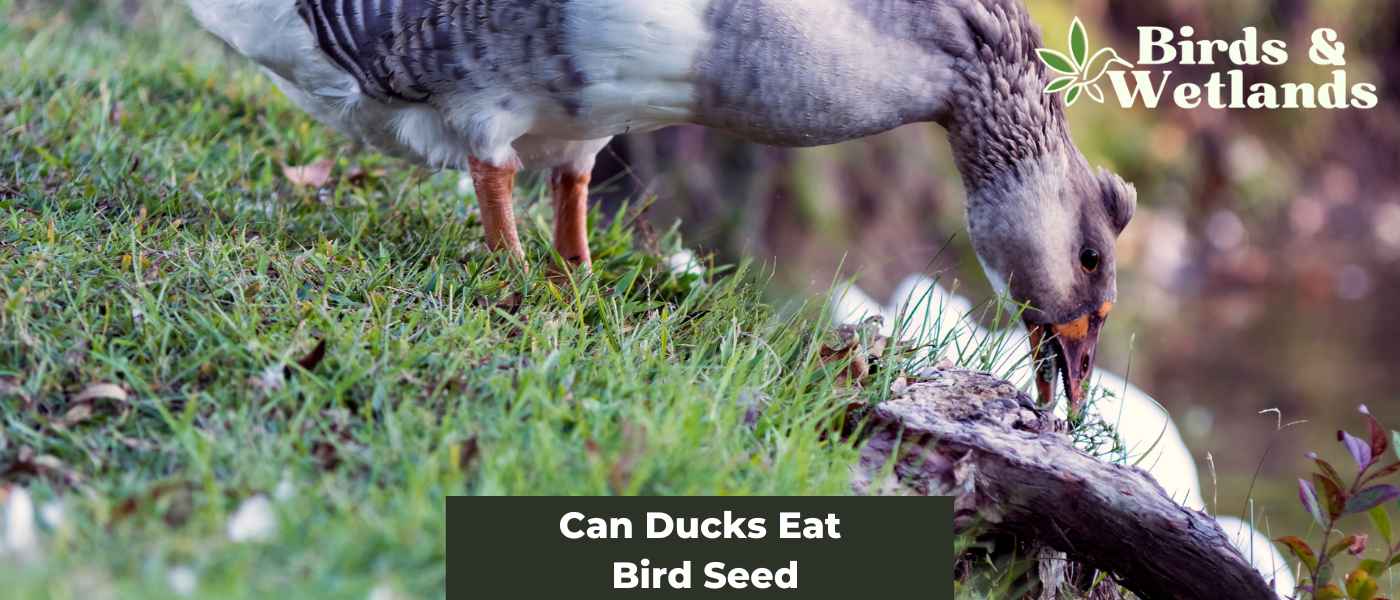Are you a bird lover who also happens to have ducks?
You might be wondering if it’s safe to share your feathered friends’ food.
But can ducks actually eat bird seed?
Yes, ducks can eat bird seed as it can be a nutritious part of their diet. Bird seed typically contains a mix of seeds, grains, and occasionally dried fruits or insects, which can provide ducks with essential nutrients, such as proteins, carbohydrates, fats, vitamins, and minerals. However, bird seed should not be the sole food source for ducks.
Key Takeaways on Can Ducks Eat Birdseed
- Ducks can eat some types of bird seed, but not all
- Seed mixes with high amounts of sunflower seeds and millet are not recommended for ducks
- Providing a varied diet for ducks is important for their health and nutrition
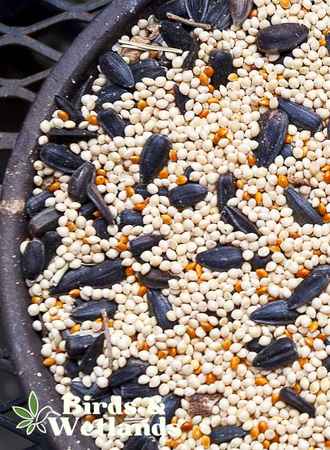
Is feeding ducks bird seed healthy?
Ducks are fascinating species. They are omnivores that feed on both plants and animals. They love aquatic vegetation, insects and small fish. But they will not say no to a handful of bird seeds.
Birds seeds offer many nutritional and health benefits to ducks. In fact, one of the main pros of feeding wild ducks bird seeds is that they mimic a duck’s natural diet.
In the wild, ducks forage for a variety of seeds, grains, and insects to eat. By providing them with bird seeds, you are offering them food that more closely resembles what they would eat in their natural habitat.
For example, if you offer a birdseed mix of sunflower seeds, millet, and cracked corn, you are providing a range of nutrients and flavors that ducks would naturally find in the wild.
While bird seeds don’t give ducks all the necessary nutrients, they can still be healthy food.
It’s important to remember that ducks should be supplemented with other types of food, such as vegetables and insects, to ensure a balanced diet. However, bird seeds can be a useful and enjoyable part of their diet.
Here are the health benefits of feeding birdseed to ducks:
Energy Boosters
Bird seeds may not be the best food for ducks but it can boost a duck’s energy in several ways. Firstly, the nutrients found in bird seeds, such as carbohydrates, protein, and fats, can give ducks energy.
Carbohydrates, in particular, are an important source of energy for ducks, as they are broken down into sugar (glucose) in the body and used to fuel the duck’s muscles and other tissues.
Protein and fats can also be used as energy sources, although they are typically used more for tissue repair and maintenance rather than immediate energy.
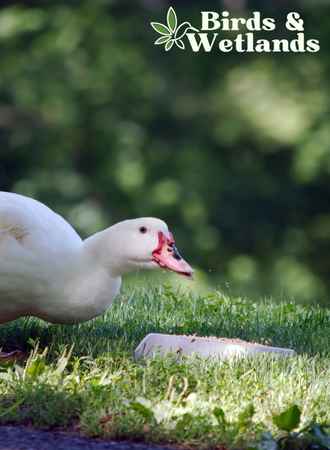
Strengthens the Immune System and Cardiovascular Health
Certain nutrients in bird seeds can help promote immune system stimulation and good for the duck’s overall health. Here are a few examples:
- Vitamin E is an antioxidant that can help protect cells from damage caused by free radicals and unstable molecules that can harm cells and tissues. Vitamin E can also help support the immune system by activating certain immune cells.
- Zinc is important for the development and function of immune cells, and a deficiency can weaken immunity.
- Selenium helps protect cells from damage caused by free radicals.
- Omega-3 fatty acids support the immune system by reducing inflammation and enhancing immune cell function.
- Bird seeds contain a good amount of polyunsaturated and monounsaturated fats which are important for improving cardiovascular health and preventing high blood pressure.
Promotes Healthy Digestive System
Bird seeds can promote a healthy digestive system in ducks in several ways:
- Bird seeds are a good source of dietary fiber, which helps add bulk to the duck’s feces and helps keep the digestive system functioning properly. Different seeds and grains contain different types of fiber, such as insoluble and soluble fiber, both of which have health benefits.
- Some bird seeds, such as flax and chia seeds, contain prebiotics, non-digestible carbohydrates that stimulate the growth of good bacteria in the digestive system. These good bacteria can help keep the digestive system balanced and healthy.
- Some bird seeds, such as pumpkin seeds, contain enzymes that help break down food and aid digestion.
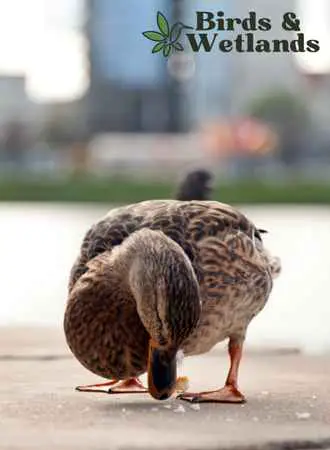
Can baby ducks eat bird seed?
Bird seeds can provide baby ducks with an excellent source of nutrition and a great way to supplement their diet and add variety, especially when they are transitioning from their initial duck starter feeds and beginning to eat more solid food items.
However, it is important to remember that too much bird seed in the diet can cause health issues for baby ducks.
When feeding ducklings bird seeds, it’s best to give them a small amount. Monitor how their bodies respond and determine if they need more or less of it in their diet.
It’s also important to give them other high-quality food sources such as dark leafy greens, grains, and even small insects like mealworms on occasion. These food items will provide them with essential vitamins, minerals, and nutrients for healthy development.
For example, insects have very high protein content, which can be especially beneficial for younger ducks as they grow quickly during this stage.
The type of bird seed you feed your ducklings also matters since not all types are suitable for them. Certain kinds of bird seed may contain too many hulls or contain ingredients like sunflower kernels which are difficult for young ducks to digest properly. Choose bird seed mixes with fewer hulls and don’t have high cholesterol content.
It is also important to ensure the bird seed is fresh before you feed it to ducklings since spoiled food can lead to gastrointestinal issues in these birds.
Can ducks choke on bird seeds?
Geese and ducks can choke on bird seeds if they are too big for the duck’s throat. Ducks, unlike other birds, do not chew their food before swallowing, so they must be very careful with what they eat.
If a duck were to swallow a bird seed that was too large, it could get stuck in the animal’s throat and cause choking. This type of choking can be both dangerous and deadly for ducks.
To prevent choking, ducks should be offered smaller seeds that are easier to swallow, such as millet or canary seeds.
Ducks may also benefit from wetting their feed with water or other softening substances before eating it, reducing the risk of choking.
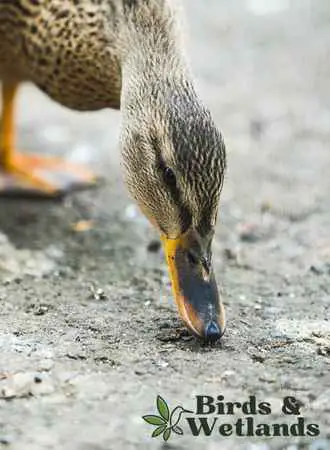
How much birdseed can ducks consume?
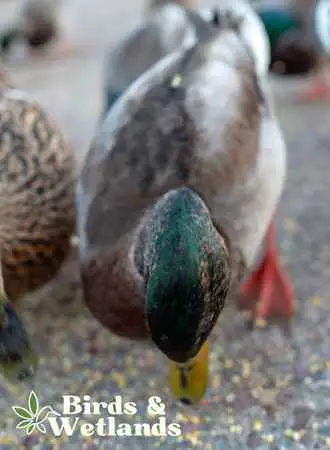
Ducks are omnivorous animals, and bird seeds can be a great supplemental addition to their diet. However, limiting how many bird seeds your ducks eat is important.
Overeating can lead to nutritional imbalances and digestive problems. If ducks or wild birds consume too many calories without adequate exercise, they may become overweight or obese.
Most bird seeds are good for the duck’s body, but some seeds may contain additives that can cause digestive problems or toxic components. Please read the label on the packaging to ensure you’re only feeding your ducks with high-quality bird feed.
How to feed ducks bird seeds
Like other waterfowl, ducks enjoy eating aquatic plants and invertebrates.
- Toasted sesame seeds and melon seeds are some of the duck’s favorite seeds but should only be given as an occasional treat.
- Bird seeds are versatile that you can mix with other foods. For instance, mixing bird seeds with leafy vegetables can make a healthy snack.
- Find a proper location to feed the ducks. Look for an area near a body of water where you can stand safely on shore, such as a dock or walkway along the bank.
- Gently shake the bag of birdseed to disperse it evenly across the ground or water’s surface so that all ducks can eat it at once.
- Duck food should always be restricted in quantity since overfeeding them can lead not only to obesity but also malnutrition due to an imbalanced diet without enough vitamins and nutrients they need for healthy development and growth.
- Clean your feeding area and remove any uneaten food to prevent bacteria growth and attracting critters, rodents and other wildlife.
- While birds seeds are perfectly fine for feeding ducks, stop feeding them if your ducks are acting differently after eating bird seeds.
- You can drop your bird seed mixes in shallow water or put them in a tray or feeding bowl.
Other Similar Foods for Ducks
| Bread | Is Bread Safe for Ducks? |
| Rice | Can Ducks Enjoy Rice? |
| Oats | Feeding Ducks Oats |
| Sunflower Seeds | Sunflower Seeds: A Duck Treat |
| Bird Seed | Can Ducks Eat Bird Seed? |
| Corn | Can Ducks Eat Corn? |
Best Duck Feed Pellets
Are you a duck owner looking for the perfect feed to keep your feathered friends happy and healthy? Look no further than Purina Duck Feed Pellets! With their nutritionally balanced formula and high-quality ingredients, these pellets are the ultimate solution for providing your ducks with the nutrition they need to thrive.
Pros
- Complete Nutrition: Purina Duck Feed Pellets are nutritionally balanced to provide all the essential vitamins and minerals that ducks need to stay healthy and strong.
- Easy to Digest: The pellets are specially formulated to be easy to digest, which makes them ideal for ducks of all ages.
- Promotes Growth and Development: With its balanced nutrition formula, Purina Duck Feed Pellets are designed to support healthy growth and development in ducks.
- Suitable for All Breeds: Whether you have domestic ducks or wild ducks, Purina Duck Feed Pellets are suitable for all breeds of ducks.
- Trusted Quality: Purina has been producing high-quality animal feed for over 100 years, so you can trust that your ducks are getting the best possible nutrition with Purina Duck Feed Pellets.
Cons
- Cost: Compared to other types of duck feed on the market, Purina Duck Feed Pellets can be slightly more expensive. However, many customers feel that the high-quality ingredients and balanced nutrition formula are worth the extra investment.
- Pellet Size: Some customers have noted that the pellet size of Purina Duck Feed Pellets can be quite large, which may not be suitable for smaller or younger ducks. However, many customers have reported that the pellets can easily be broken up or soaked in water to make them easier to eat.

